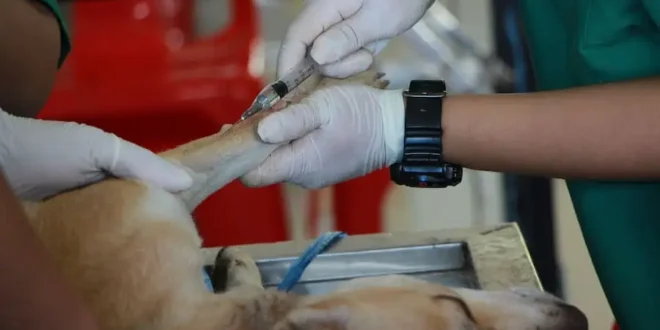Veterinarians administer amoxicillin to sick dogs, but can I give my dog human amoxicillin 500mg when sick?
Situations like lack of money or distance to the vet might tempt you to give your dog human amoxicillin, especially when it can improve your condition.
Amoxicillin is a broad-spectrum antibiotic administered by healthcare professionals to humans and dogs to treat bacterial infections.
However, since the dosage in both is different, you might wonder if giving humans amoxicillin 500mg to dogs is safe.
Well, let’s find out if it is safe; look at the preferred dosage for dogs, and see how you can safely administer it to your dog.
So, Can I Give My Dog Human Amoxicillin 500mg?
Yes. You can give your dog human amoxicillin 500mg, but only if it weighs 50 pounds or more. Amoxicillin dosage for dogs is 5/10 mg per lb. of its body weight every 12-24 hours.
However, it is good to go to the veterinarian to help you determine the exact dosage based on the bacterial infection the dog needs amoxicillin for.
How Much Amoxicillin Can You Administer To Your Dog
The exact amount of amoxicillin that you should administer to your dog should be prescribed by your veterinarian.
But what if your home is far from the town where your veterinarian is? Will you let your dog stay in pain for the whole drive?
Here is the exact amount of amoxicillin you can give your dog to ease its pain before you drive to the vet:
| Weight Of Your Dog In Pounds | Daily Dosage In Milligrams |
| 5-10 | 50-100 |
| 10-25 | 100-250 |
| 25-50 | 250-500 |
| 50-100 | 500-1000 |
Veterinarians usually prescribe amoxicillin based on the dog’s weight, and the diagnosis usually takes 10-14 days.
This broad-spectrum antibiotic has a dosing ratio of 5/10 mg per lb. However, if your vet gives you different instructions, you should follow them.
It would be best to administer antibiotics to your dog for the period set by your veterinarian without skipping.
Does skipping can lead to the recurrence of the infection or the development of antibiotic resistance by your dog rendering the medicine ineffective?
Infections On Dogs That Can Be Cured By Administering Amoxicillin
Amoxicillin is a very effective treatment for many bacterial infections in dogs. Though some dog infections can’t be cured by amoxicillin, your vet can guide you on the best alternative for medication.
Some of the common bacterial infections in dogs that can change by amoxicillin include:
1. Respiratory Infection
Infections in your dog’s respiratory tract can cause lung problems, affecting breathing patterns. The bacteria could cause; pneumonia, bronchitis, or kennel cough in your dog, which are all treatable with amoxicillin.
2. Ear Infections
Your dog might still develop an ear infection even if you clean its ears regularly. Ear infections are a common problem for most dogs, but not all are treatable by administering amoxicillin. However, the few that are treatable include Streptococcus and Staphylococcus.
3. Urinary Tract Infection (UTI)
A UTI is another bacterial infection that often takes over a dog’s bladder, urethra, uterus, and kidneys.
A dog exposed to Staphylococcus, Proteus, or E. coli can contract a urinary tract infection. Administering of amoxicillin can help treat the infection.
4. Dental Infection
Dental infections are less common in dogs but can be fatal if you leave them untreated. A dog’s dental infections are similar to those of humans, with examples including gingivitis, tooth abscesses, and periodontal disease.
5. Skin Infection
Bacteria also cause skin infections, such as hot spots, pyoderma, and skin abscesses in dogs. Your dog can also acquire a skin infection through the bite of another sick dog.
Therefore you should be careful of what dogs your dog interacts with, as a bite wound can spread bacteria through skin exposure or another dog’s mouth.
Potential Side-effects Of Administering Amoxicillin On Dogs
When you administer amoxicillin to your dog, its body digests it along with all the bacteria in the dog’s body, including the good bacteria. This action of the antibiotic can irritate your dog with gastrointestinal tract irritation.
The irritation could include; loss of appetite, skin irritation, diarrhea, nausea, and abdominal pain. Head to your veterinarian to check if your notice your dog displaying these symptoms after you give amoxicillin.
A veterinarian can prescribe probiotics to your dog to help with gut irritation. Introducing healthy bacteria back into the gut can reduce some irritation symptoms in your dog; hence it can relax as it recovers from the infection.
How To Administer Amoxicillin On Dogs
If you are struggling with administering amoxicillin to your dog, don’t worry. There are simple tricks you could implement depending on the amoxicillin form, either tablet, liquid, or capsule, that you have.
Like many children, dogs do not like medicine, and they are notorious such that they can sniff out even the slightest difference in food. Some few ideas you could implement to administer amoxicillin to your dog include:
Hide It In Food
Depending on the form you acquired the amoxicillin in, you can still hide it in your dog’s favorite food.
For example, if your dog loves apple sauce and you have a capsule, you can mix it with a capsule and feed it to your dog. If you have liquid amoxicillin, mix it in your dog’s broth and give it to drink.
Back Of The Mouth
Some intelligent dogs are very good at spitting or hiding medicine. Therefore, you might have to improvise differently. Gently open your dog’s mouth and place a capsule at the very end of the mouth near the throat.
Ensuring your dog gets all its doses is a great idea, which works best for very stubborn dogs. This trick aims to ensure that the dog does not feel the spit out or the taste of the medicine.
Pill Pocket
It is another way of administering amoxicillin to your dog through food. Veterinary offices will often have pill pockets containing dog treats. You could easily slide one pill pocket into a tablet or a capsule.
So, as your dog enjoys the treats, it will take the medicine without knowing. It is an excellent trick to pull on your dog if it likes to get stubborn while administering medication.
What If Your Dog Spits Out Amoxicillin?
A notorious dog might spit out amoxicillin as it neither likes the taste nor understands the benefits. Call your veterinarian immediately if your dog misses a dose or spits the amoxicillin.
Missing out on a dose or spitting amoxicillin can be a big deal as the antibiotic works by counteracting the multiplication of bacterial infections. Missing out on a dose means the bacterial cell will have time to build up and even resist the antibiotic.
The infection can reestablish itself, becoming worse than it was before. It is best to call your veterinarian as soon as you realize your dog spat or vomited the dose.
Do not try to readminister the dose to your dog without the vet’s approval, as overdosing can have adverse side effects.
Can All Dogs Take Amoxicillin
Like humans, dogs cannot take amoxicillin as a treatment option due to conditions like:
1. Hypersensitivity
If your dog is susceptible to amoxicillin, you should not administer it as it will add more pain. A highly sensitive dog to amoxicillin might constantly vomit or get a high fever from ingesting the antibiotic.
It’s why you must call your vet when you notice your dog vomiting after administering amoxicillin.
2. Pregnant/Lactating
A pregnant dog might need special care and medication to recover from the infection. Administering amoxicillin to a pregnant dog can affect the growth of its young one in the womb leading to more complications.
Sometimes amoxicillin can be so strong that it may destroy the life of the dog’s fetus. Furthermore, a lactating dog needs a lot of nutrients to provide quality milk for its puppies which need the milk for growth and development.
Amoxicillin can affect the quality of the breast milk resulting in poor growth and development of the puppies. Nonetheless, the puppies can also contract the infection from their mother, which could be fatal to them.
3. Allergies
Like humans, dogs also have allergies. You can’t give the antibiotic if your dog is allergic to any substances that make up amoxicillin.
Additionally, if your dog is already allergic to; Penicillin, beta-lactam, or cephalosporin, you shouldn’t administer amoxicillin.
It would also be best to mention that your dog has allergies to the vet as you take it for treatment of the infection.
If you do not know that your dog has allergies, call the vet whenever you notice a negative change after giving your dog the antibiotic.
4. Your Dog Is In A Prescription Non-compatible To Amoxicillin
Sometimes your dog might develop an infection while it is on another prescription. Before administering amoxicillin to it, ensure you know its current medication is compatible with the antibiotic. Otherwise, you should seek a new treatment option.
Nonetheless, amoxicillin might be ineffective if your dog has a condition like blood infection, shock, or systematic diseases.
Conclusion
Amoxicillin is administered to dogs according to weight, and this answers the question, can I give my dog human Amoxicillin 500mg? The amoxicillin dosage for dogs is 5/10mg per pound, and you can only give your dog human amoxicillin 500mg if it weighs 50 pounds and above.
However, if you notice your dog has an infection, such as tooth abscesses, you should first call/visit a veterinarian. Establish creative ways to administer the antibiotic to your dog, especially if it is stubborn or notorious.
Not all dogs can take amoxicillin for various reasons, and you should liaise with your vet before doing so. Nonetheless, your vet should be the first go-to person when your notice your dog has an infection.
 Being Human
Being Human





